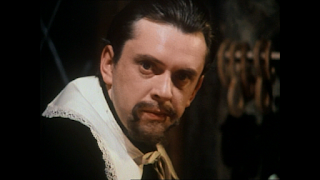Rewatching some of 'The Masque Of Mandragora' this week has reminded me of just how fascinating the history of astronomy is.
In recent years, when 'Doctor Who' has done history, it's tended to go for a type of story that might be described as Celebrity Historical, with Winston Churchill, Queen Victoria and a whole bunch of famous writers such as Agatha Christie, Charles Dickens and the grandaddy of them all, William Shakespeare.
Now, the Doctor claims he's already met Shakespeare some time before the events of 'Planet Of Evil' and then there's the Hamlet handwriting scene in 'City Of Death'. Also in this latter story, the Doctor never quite gets to meet Leonardo da Vinci, having also missed him in 'Masque'.
All of which is something of a shame, as it the fact that we never get to see the Doctor's encounter with Newton, mentioned in 'The Pirate Planet'.
For a series which was originally themed around the twin subjects of Science and History, it's acutally quite rare for us to get stories which touch on Historical Science, with Stephenson in 'The Mark Of The Rani' being one of the few stand-out characters in this area. Sadly, 'Mark' gets bogged down with the Master and the Rani vying for the limelight, so younger viewers get little clue as to who this bloke actually is. And we never see hide nor hair of the Industrial Revolutionaries who have been invited along for the ride.
As a kid, I read quite a few books on astronomy and the early sections were often keen to illustrate how today's scientists really are standing on the shoulders of giants.
'The Masque Of Mandragora' is set in that fascinating period when astrology is slowly evolving into astronomy, in the same way that alchemy begat modern chemistry. There are a whole host of natural philosophers (the word 'scientist' would not be coined for quite some time) that would be wonderful subjects for a 'Doctor Who' story.
Indeed, if you take a look at what some people write about both before and after the 15th century, you cannot help but think that they once took a trip in the TARDIS.
Franciscan friar Roger Bacon lived in Oxford in the 13th century, yet somehow manages to think about such vehicles as cars and flying-machines. He did appear in the Fourth Doctor book 'Asylum' by Peter Darville-Evans and I couldn't resist writing a 'Toby & Lucie' script that went by the shameless name of 'Bring Home Bacon', but it's long overdue for him to make an appearance on the telly.
Another suggestion for Chris Chibnall is to centre a story around Johannes Kepler and Tycho Brahe.
They feature in the third episode of Carl Sagan's marvellous series 'Cosmos' ('Harmony Of The Worlds') and score highly for being important figures in the discovery of the motion of the planets. Even better, Kepler looks a little like Anthony Ainley's version of the Master and Brahe has a gold nose and seems to be played by Stephen Fry with a stick-on beard.
Kepler even writes what might be considered and early work of science fiction ('Somnium' = 'The Dream') where he describes a trip to the moon that involves daemons...
So, let's have a Celebrity Scientist Historical at some point in the future...
But remember never to look at the sun through a telescope, of course!
Our nattering about 'The Masque Of Mandragora' and 'The Hand Of Fear' can be seen here.
(By Andrew Trowbridge)













You were always such a bonus as Sutton Park's own scientist! We didn't need celebrity ones! ;)
ReplyDelete